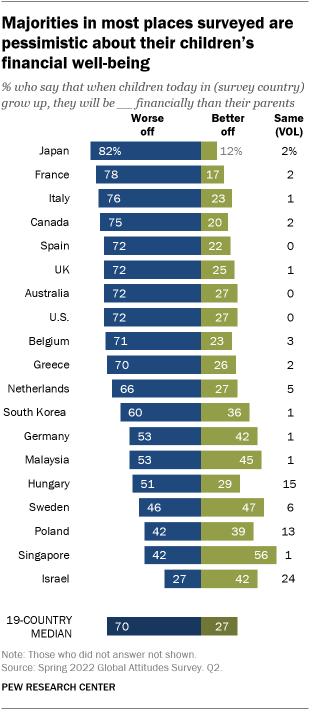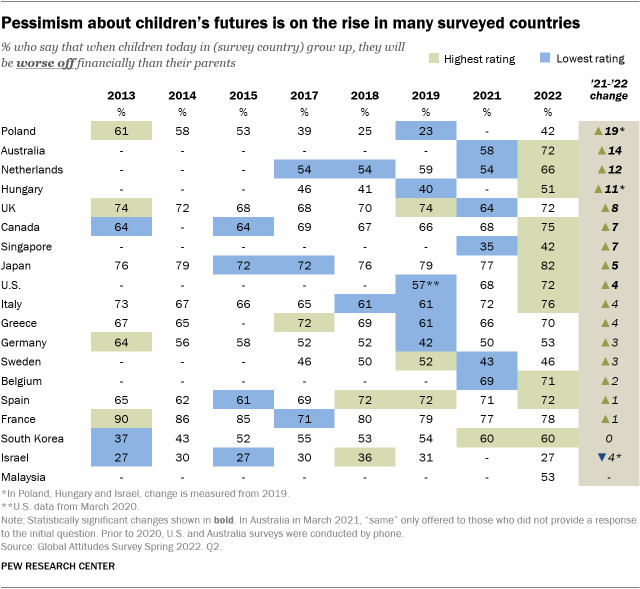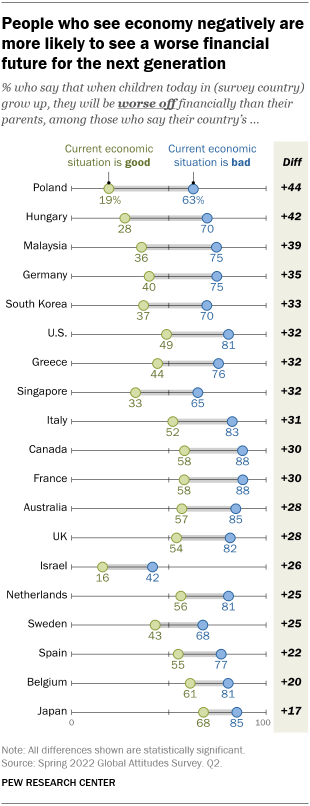When asked how children in their country will fare financially when they grow up, a median of 70% of adults across 19 countries say they will be worse off than their parents, according to a Pew Research Center survey conducted this spring.

At least three-quarters of adults in Japan, France, Italy, and Canada say children will be worse off financially than their parents, as do majorities in Spain, the United Kingdom, Australia, the United States, Belgium, Greece, and the Netherlands, and South Korea. Singapore is the lone country surveyed where a majority of adults (56%) believe the next generation will be better off financially.
In Israel, Hungary, and Poland – where the surveys were conducted through face-to-face interviews – more than one-in-ten volunteered a response of “same,” meaning they believe children will have about the same financial situation as their parents. Still, Hungarians are more pessimistic than optimistic about the financial future of children in their country, while Israelis are more optimistic and Poles are almost evenly split.
In nine of the countries surveyed, the percentage of people who say children are going to be worse off than their parents has increased significantly since the question was last asked. For example, 42% of respondents in Poland say the youngest generation will be worse off financially – nearly double the 23% who said so in 2019.

The proportion of people with a pessimistic view of children’s financial future is up by 14 percentage points in Australia, 12 points in the Netherlands, and 11 points in Hungary since the last time the question was asked in each country. Smaller but still significant increases in these views occurred in the UK, Canada, Singapore, Japan and the U.S.
In 11 of the countries surveyed this year, a record or near record high percentage of adults say children will be worse off financially than their parents. In South Korea, for example, there has been a steady increase since the question was first asked in 2013 in the share of adults who say children will be worse off than their parents.
In other countries, however, the share of adults who see a worse financial future for children is lower than in previous years. In France, for example, 90% of adults said in 2013 – during the eurozone public debt crisis which resulted in a French recession – that children would be financially worse off than their parents.

In all 19 countries surveyed, people with a negative view of their country’s current economic conditions are far more likely to believe that children in their country will be worse off in the future. In Poland, for example, 63% of those with a negative view of the country’s current economic situation believe children will be worse off in the future. Among Polish adults who see the country’s current economic situation as a good, contrast, only 19% share this view. Even in Japan, where the difference is the smallest of 19 countries, the gap stands at 17 points.
Even among those with a positive view of their country’s current economy, however, many are pessimistic about the financial prospects of the next generation. In 10 countries – the U.S., Italy, the UK, Spain, the Netherlands, Australia, Canada, France, Belgium, and Japan – around half or more of adults with a positive view of the economy nevertheless expect children to be worse off than their parents.
Note: Here are the questions used for this analysis, along with responses. Visit our methodology database for more information about the survey methods outside the U.S. For respondents in the U.S., read more about the ATP’s methodology.


